5 books about van Buitenen, J. A. B.
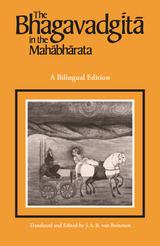
The Bhagavadgita in the Mahabharata
Edited by J. A. B. van Buitenen
University of Chicago Press, 1981
No other Sanskrit work approaches the Bhagavadgita in the influence it has exerted in the West. Philosophers such as Emerson and the other New England Transcendentalists were deeply affected by its insights, a dozen or more scholars, including Annie Besant and Mahatma Gandhi, have attempted its translation, and thousands of individuals struggling with the problems divided loyalties have found comfort and wisdom in its pages.
The Bhagavadgita ("Song of the Lord") tells of the young and virtuous Prince Arjuna who is driven to lead his forces into battle against an opposing army composed of close relatives and others whom he loves. The Lord Krsna, appearing in the poem as Arjuna's friend and charioteer, persuades him that he must do battle, and we see Arjuna changing from revulsion at the thought of killing members of his family to resignation and awareness of duty, to manly acceptance of his role as warrior and defender of his kingdom.
The Bhagavadgita is a self-contained episode in the Mahabharata, a vast collection of epics, legends, romances, theology, and metaphysical doctrine that reflects the history and culture of the whole of Hindu civilization. The present edition forms a part of J. A. B. van Buitenen's widely acclaimed translation of this great work. Here English and Sanskrit are printed on facing pages, enabling those with some knowledge of Sanskrit to appreciate van Buitenen's accurate rendering of the intimate, familial tone and directness of the original poem.
The Bhagavadgita ("Song of the Lord") tells of the young and virtuous Prince Arjuna who is driven to lead his forces into battle against an opposing army composed of close relatives and others whom he loves. The Lord Krsna, appearing in the poem as Arjuna's friend and charioteer, persuades him that he must do battle, and we see Arjuna changing from revulsion at the thought of killing members of his family to resignation and awareness of duty, to manly acceptance of his role as warrior and defender of his kingdom.
The Bhagavadgita is a self-contained episode in the Mahabharata, a vast collection of epics, legends, romances, theology, and metaphysical doctrine that reflects the history and culture of the whole of Hindu civilization. The present edition forms a part of J. A. B. van Buitenen's widely acclaimed translation of this great work. Here English and Sanskrit are printed on facing pages, enabling those with some knowledge of Sanskrit to appreciate van Buitenen's accurate rendering of the intimate, familial tone and directness of the original poem.
[more]
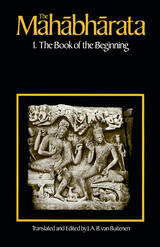
The Mahabharata, Volume 1
Book 1: The Book of the Beginning
Edited by J. A. B. van Buitenen
University of Chicago Press, 1973
The Mahabharata, an ancient and vast Sanskrit poem, is a remarkable collection of epics, legends, romances, theology, and ethical and metaphysical doctrine. The core of this great work is the epic struggle between five heroic brothers, the Pandavas, and their one hundred contentious cousins for rule of the land. This is the first volume in what will ultimately become a multi volume edition encompassing all eighteen books.
[more]
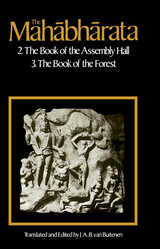
The Mahabharata, Volume 2
Book 2: The Book of Assembly; Book 3: The Book of the Forest
Edited by J. A. B. van Buitenen
University of Chicago Press, 1975
The Mahabharata, an ancient and vast Sanskrit poem, is a remarkable collection of epics, legends, romances, theology, and ethical and metaphysical doctrine. The core of this great work is the epic struggle between five heroic brothers, the Pandavas, and their one hundred contentious cousins for rule of the land. This is the second volume of van Buitenen's acclaimed translation of the definitive Poona edition of the text. Book two, The Book of the Assembly Hall, is an epic dramatization of the Vedic ritual of consecration that is central to the book. Book three, The Book of the Forest, traces the further episodes of the heroes during their years in exile. Also included are the famous story of Nala, dealing with the theme of love in separation, and the story of Rama, the subject of the other great Sanskrit epic, the Ramayana, as well as other colorful tales.
[more]
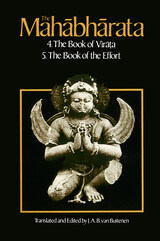
The Mahabharata, Volume 3
Book 4: The Book of the Virata; Book 5: The Book of the Effort
Edited by J. A. B. van Buitenen
University of Chicago Press, 1978
The Mahabharata, an ancient and vast Sanskrit poem, is a remarkable collection of epics, legends, romances, theology, and ethical and metaphysical doctrine. The core of this great work is the epic struggle between five heroic brothers, the Pandavas, and their one hundred contentious cousins for rule of the land. This is the third volume of van Buitenen's acclaimed translation of the definitive Poona edition of the text. Book 4, The Book of Virata, begins as a burlesque, but the mood soon darkens amid molestation, raids, and Arjuna's battle with the principal heroes of the enemy. Book 5, The Book of the Effort, relates the attempts of the Pandavas to negotiate the return of their patrimony. They are refused so much as a "pinprick of land," and both parties finally march to battle.
[more]
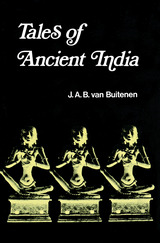
Tales of Ancient India
Edited by J. A. B. van Buitenen
University of Chicago Press, 1969
"This admirably produced and well-translated volume of stories from the Sanskrit takes the Western reader into one of the Golden Ages of India. . . . The world in which the tales are set is one which placed a premium upon slickness and guile as aids to success. . . . Merchants, aristocrats, Brahmins, thieves and courtesans mingle with vampires, demi-gods and the hierarchy of heaven in a series of lively or passionate adventures. The sources of the individual stories are clearly indicated; the whole treatment is scholarly without being arid."—The Times Literary Supplement
"Fourteen tales from India, newly translated with a terse and vibrant effectiveness. These tales will appeal to any reader who enjoys action, suspense, characterization, and suspension of disbelief in the supernatural."—The Personalist
"Fourteen tales from India, newly translated with a terse and vibrant effectiveness. These tales will appeal to any reader who enjoys action, suspense, characterization, and suspension of disbelief in the supernatural."—The Personalist
[more]
READERS
Browse our collection.
PUBLISHERS
See BiblioVault's publisher services.
STUDENT SERVICES
Files for college accessibility offices.
UChicago Accessibility Resources
home | accessibility | search | about | contact us
BiblioVault ® 2001 - 2024
The University of Chicago Press









